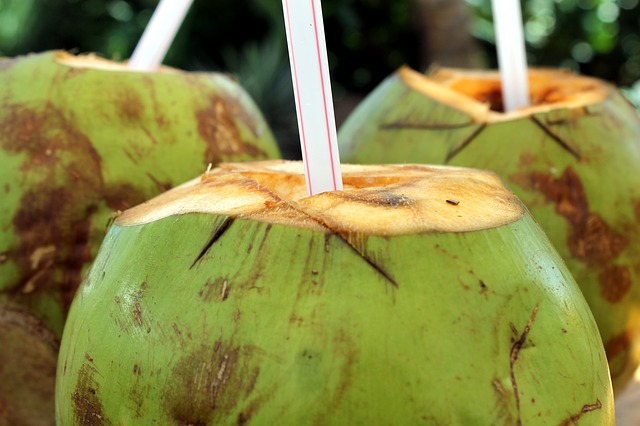
The popularity of coconut water really exploded the past few years, particularly because it’s a more natural alternative to a traditional sports drink that still packs some of the benefits. This is appealing to anyone who is trying to stay hydrated, but particularly the physically active. (Okay and the hung over.) But is it really as good for you as the hype would leave you to believe?
One thing to know about coconut water is that it is far superior as a potassium choice than when it comes to sports drinks, having 15 times more in fact. Each eight ounces of the stuff contains 470 milligrams of potassium, which even beats a medium sized banana which contains around 422 milligrams of the stuff.
Potassium is an important aspect of rehydration, since the electrolyte helps to balance fluid in the body which is does working alongside the minerals sodium, magnesium, and also calcium. Without it the smooth muscles might start to cramp up, when it comes to hangovers it can help to prevent bloating and headaches.
One thing that coconut water does not have much of however, is salt. It sounds counterintuitive to drink salt to rehydrate yourself, but the body needs it to hold onto the water. Sports drinks are way superior when it comes to the salt department, having about three times as much and a reasonable amount for the recovering body that doesn’t go overboard. Coconut water tends to contain around 30 mg per 8 ounces. To put into perspective why it can be important to fuel up with it after a really intense workout, losing one liter of sweat can take about 1,300 milligrams of sodium with it.
Both coconut water and sports drinks both contain sugar, but the difference is that sports drinks are using artificial flavor and refined sugar to sweeten up their drinks, while coconut water naturally contains the sugar in its natural state as a coconut. Some flavored coconut water drinks add in sugar as well, but you can find ones that do not. Most bottles of coconut water contain around nine grams of sugar, which is a mixture of glucose, fructose, and sucrose, so what you’re actually getting is a little different than when you compare it to the sugar content on a sports drink or any other artificial drink.
Those sugars are easily digestible carbohydrates for the body to use, which can also help the body recover following a workout. But do keep in mind of course that there are still calories involved in drinking coconut water, so you shouldn’t be chugging the stuff down all day. What it comes down to is that overall most nutritionists would suggest drinking coconut water over a sports drinks on a regular basis, but if you are participating in highly strenuous sports where you need the sodium that is something to keep in mind about finding other alternatives.
Either way, when it comes to generally staying hydrated throughout the day, sticking with water is best.

I love it